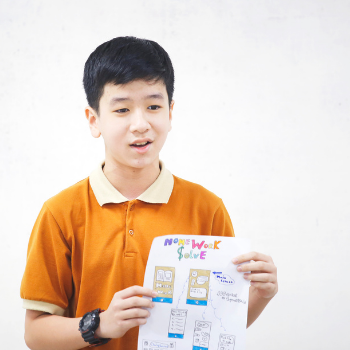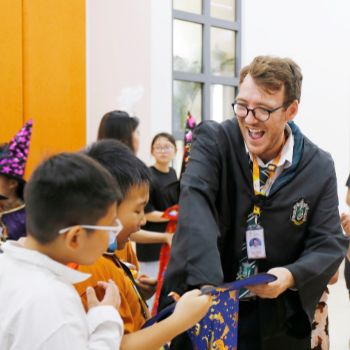In case your questions are not answered here, you can contact our Admissions department for timely consultation. Hotline: (028) 710 78887
-
When was UTS established?
US Vietnam Talent International School was established in 2018, and is a member of Van Lang Education System. UTS offers an international bilingual general curriculum from Grades 1 to Year 12. UTS has the mission of building a happy environment, fostering the foundation of knowledge, personality, and skills of global citizens.
UTS currently has 3 campuses in Ho Chi Minh City. Our journey of “Growing talent with care” begins with the UTS Van Lang Complex (Binh Thanh – Go Vap), which is located in the Van Lang Education Complex and provides students with the chance to pursue higher education. And UTS Botanique Campus (District 4) opened in 2022 to bring nature into the classroom, creating a safe and caring learning environment for all children in Ho Chi Minh City. UTS Saigon South Campus (Binh Chanh) is a part of our plan to continue our mission to provide a setting that fosters the joy of learning and spreads sustainable ideals for students to become the best versions of themselves.
-
How students’ competency is assessed at UTS?
For the National Program, UTS evaluates based on the regulations of the Ministry of Education – the grades in class and periodic exams (mid-term, end-of-term). In addition, during the learning process, UTS students are evaluated in the direction of access to competence through innovative products, the ability to creatively apply knowledge in different application situations. In other words, competency assessment is an assessment of knowledge, skills, and attitudes throughout the learning process in order to improve students’ academic performance.
For the International Program, students take the school’s thematic test and the MAP test is organized by NWEA USA with 4 subjects: Math – Reading – Language Usage – Science. This is an adaptive assessment, if you answer one question correctly, then the next one will be more difficult. If you answer wrong, then the question will be easier. This form of assessment creates challenges for top excellent students without being overwhelmed by students with lower skill levels than their level. The results of the test will specify the ability of students in each topic/skill of each subject, helping them have a learning plan to train themselves better. In addition, UTS can look at the competency profiles of students throughout the school to adjust the teaching method, adjust the learning according to each individual and monitor the progress of each student.
Particularly for the Oxford International Curriculum, the student’s assessment test will be built by the teacher, based on the annual updated test bank from the Oxford University Press, ensuring the objective assessment throughout each academic year. -
Is the international program taught by international teachers or Vietnamese teachers?
For each class, there will be a different distribution of international teachers and Vietnamese teachers, but on average, international teachers will take on 80% of the lessons for the international program. Vietnamese teachers will be in class for the remaining 20% of classes. But for elementary and sixth grade classes, in all the hours of international teachers, Vietnamese teachers will be involved in supporting students in class.
-
After each school level, what English standardized tests can they take?
After each year, all the students are qualified for a different Test. After primary school, students are qualified to sit for Cambridge’s A2 Test, specifically, the Flyers qualification. For secondary school, students are expected to take A2 Key and B1 Preliminary qualifications and when they get to grade 9, we expect them to take the IELTS test and as we go up the scale from grade 9 to grades 11 and 12, we really expect our students to be getting at least a 7.0 on their IELTS for the Common Core standard International program and IELTS 7.5+ for the Oxford International program.
-
How can students balance the MOET and International Programs?
At UTS, we always try our best to create an environment that boosts the joy of learning. Every lesson is designed to trigger students’ innate curiosity about the world, and to help them think creatively about the problems and how they can address certain things.
One thing we do in particular involves the way that we communicate between our teachers both local and foreign as well as the way we’ve aligned our curricular. So both local and foreign teachers work together on lesson plans and their methodologies as well. And we design our curricular in such a way that it really helps the students to release and get rid of some of their stress while still meeting some of the necessary requirements and learning outcomes.
-
For those wishing to study abroad, what type of support can they expect?
After graduation, UTS-ers can continue their study at colleges and universities from around the world. We have annual career orientation workshops when specialized counsellors will be advising UTS students on choosing majors and post-secondary schools that most fits their interests and priorities. Universities and colleges from around the world actually send their representatives here to UTS and they attend our fair. Last year we had representatives from Singapore and Switzerland actually.
Admission requirements to different universities can be very different and they vary from place to place. UTS is here to support the students as much as we possibly can and we do so through internationally accepted tests like the IELTS. Moreover, UTS actually offers students with a variety of different extra-curricular activities and things that they can engage in outside of just the normal school programs so they can have post their application to different universities as well.














